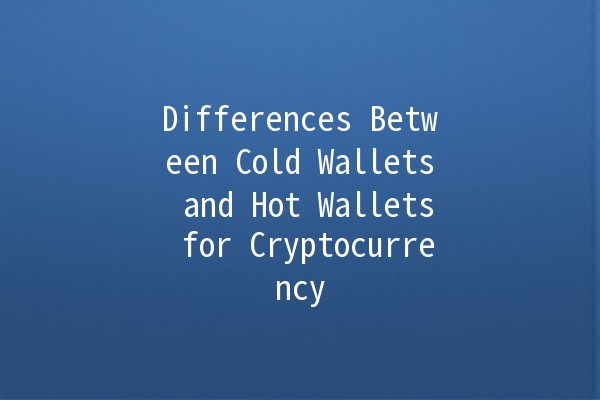




In the world of cryptocurrency, two prevalent ways to store digital assets are cold wallets and hot wallets. Understanding the distinctions between them is essential for anyone looking to safeguard their investments. This article delves into the characteristics of each type of wallet, the advantages and disadvantages they offer, and practical productivity tips related to their use.

Cold wallets are offline storage options for cryptocurrencies. They are not connected to the internet, making them significantly more secure against hacking attempts and unauthorized access.
Security: Being offline protects them from online attacks.
CostEffective: Once purchased, hardware wallets usually have no ongoing fees.
Accessibility: Requires physical access to retrieve cryptocurrency.
User Knowledge: Complex for beginners who are unfamiliar with the setup process.
Hot wallets are connected to the internet, allowing for easy access and immediate transactions. They are suitable for frequent trading and quick transfers.
Convenience: Easy to access and use for transactions at any time.
UserFriendly: Generally easier for beginners to understand.
Security Risks: Being online increases vulnerability to hacking and phishing attacks.
Control: Depending on the provider, you may not have full control over your private keys.
| Feature | Cold Wallets | Hot Wallets |
||||
| Connection | Offline | Online |
| Security Level | High | Moderate to Low |
| Convenience | Less convenient | High |
| Storage Costs | Device purchase required | Usually free, but may include fees |
| User Control | Full control of private keys | May depend on provider |
Always ensure that your hot wallets, especially mobile and desktop versions, are updated to the latest version. These updates often contain security fixes that can help protect your assets.
Application Example: Set reminders to check for updates once a month or after any major news on software vulnerabilities.
For enhanced security, consider using multisignature wallets. These require multiple private keys to authorize a transaction, adding another layer of protection.
Application Example: If you manage a joint account with friends or family, using multisignature wallets can prevent unauthorized transactions and enhance security.
Regardless of whether you use cold or hot wallets, regular backups are essential. For cold wallets, this may mean keeping a secure copy of your recovery phrase or paper wallet. For hot wallets, ensure that your data is stored securely on another device.
Application Example: Store backup information in a secure location, such as a safe or encrypted USB drive.
Don’t limit yourself to one type of wallet. Use a combination of cold and hot wallets to strike a balance between security and convenience.
Application Example: Use a hot wallet for daily transactions and a cold wallet for longterm investments.
With the rise of cryptocurrency, phishing has become more common. Being educated about different scams can protect you from losing your assets.
Application Example: Dedicate time each week to read articles or watch videos on current phishing techniques.
The best choice for longterm storage is typically a cold wallet due to its enhanced security against online threats.
No, accessing a cold wallet takes longer than a hot wallet since you need to have the physical device or paper wallet on hand.
Yes, hot wallets can be safe for transactions if proper security measures are followed, but they are more vulnerable to hacks.
This depends on your trading habits, but consider using a hot wallet frequently if you are actively trading or making transactions.
Yes, you can transfer your assets from a hot wallet to a cold wallet. Ensure you follow proper steps to safeguard the transfer process.
If you lose a hardware wallet, you can recover your funds using the recovery seed phrase, assuming you have securely stored it.
By understanding the differences between cold and hot wallets, users can better protect their investments and choose the best storage solution for their needs. The balance of security and convenience is crucial, and employing the practical tips mentioned can enhance your overall management of cryptocurrency assets. Always stay informed and proactive in securing your investments.